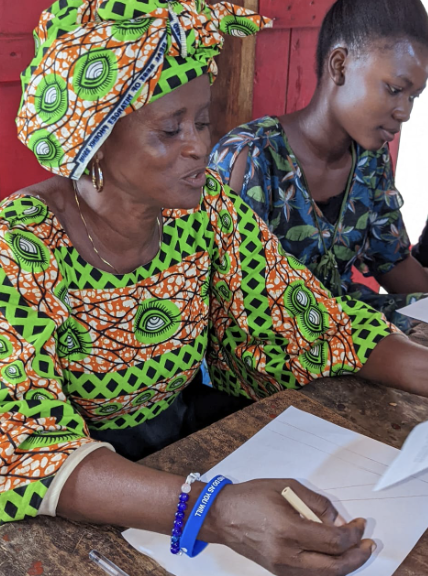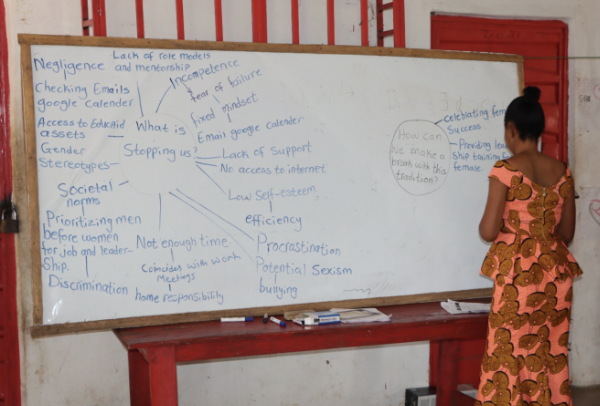The Employment Gap for Women in Sierra Leone

Bridging the Employment Gap for Women in Sierra Leone
In Sierra Leone, women continue to face deep-rooted structural and social barriers to entering and advancing in the formal workforce. According to latest data, 96.6% of women work in the informal sector, compared with 89.3% of men 1 – a gap that reflects entrenched inequalities in education, digital access, and economic opportunity. Many women are engaged in petty trading, agriculture, or small-scale entrepreneurship, often without the security, recognition, or income provided by formal employment2. Digital exclusion compounds these inequalities: women make up only 44.8% of social media users and 28.1% of LinkedIn users in Sierra Leone, limiting their visibility in professional spaces and access to employment networks3.
These statistics reveal that the employment gap is increased due to limited access to resources, technology, mobility, and decision-making power. Bridging this divide requires tackling the structural systems and social norms that restrict women’s participation and leadership, and offering real strategies to make change.
Accessing Employment
As an education and empowerment organisation rooted in equity, EducAid has witnessed firsthand the barriers young women face when transitioning from education to employment. Many young women – despite academic excellence – still encounter limited access to digital tools, mentorship, and professional networks. Cultural expectations, mobility constraints, and gender stereotypes often further restrict their participation in the formal workforce.
While legislative progress such as the Gender Equality and Women’s Empowerment Act (2022) and the Employment Act (2023) mark important steps forward, the implementation of these laws remains inconsistent. Women’s labour force participation in Sierra Leone has declined, with nearly half of women aged 15 and older now out of the workforce4, as a result of the challenges and effects of gender inequality in Sierra Leone5.
These gaps are not only barriers to equality – they represent missed opportunities for national growth. The IMF projects that closing the gender labour participation gap could raise Sierra Leone’s GDP by 4%, and closing all gender gaps could yield a 7.2% increase6.

EducAid’s Response: from Policy to Practice
EducAid’s work turns equality commitments into lived realities. Our model connects education with employability, building women’s capacity to navigate systems and transform them. Our interventions, co-designed with and at the request of female staff and students, target four key structural barriers to reduce the employment gap:
- Socio-cultural norms that restrict women’s career choices.
- Limited access to market-relevant vocational training or skills.
- Lack of visible female role models in leadership and non-traditional sectors.
- Digital exclusion from professional platforms and networks.
Through mentorship, women-led spaces, and practical, hands-on workshops, we tackle these issues head-on – creating safe, empowering environments where women gain confidence, experience, skills and agency which equips them to challenge inequitable norms and claim their space in the workplace and beyond. Since 2022, hundreds of young women have participated in EducAid’s skill-building workshops (many returning to subsequent sessions), with the majority now in paid formal employment or leadership positions within their communities.

Stories of Change
Zainab
Zainab earned her degree from Njala University but struggled to secure paid employment after graduation. Despite her academic qualifications, she discovered that a lack of practical skills, such as bike riding, public speaking, and engaging confidently with different stakeholders, blocked her from many employment opportunities.
Zainab attended a women-led skills training workshop organised by EducAid, where she received targeted training in crucial employability skills. With determination and the support of her peers, Zainab learned to ride a motor-bike – a skill often required but uncommon among women in Sierra Leone, including in her community. She also gained confidence in public speaking through practical exercises at the training.
Armed with both a degree and her new, in-demand skills, Zainab succeeded in securing paid formal employment. Zainab is now a teacher coach, providing support to over 50 teachers and improving the education quality of nearly 1,000 students in Sierra Leone.
Hassanatu
When Hassanatu discovered that she might lose a valuable job opportunity because she could not ride a motorbike, she felt deeply frustrated and discouraged that this could limit her professional growth.
She also participated in EducAid’s skills training, where she found a community of shared learning and support. Through hands-on coaching and peer encouragement, Hassanatu quickly mastered motorbike riding. This skill soon became a symbol of her resilience and empowerment, enabling her to overcome a key obstacle that once restricted her mobility and job prospects. Since then, she has been thriving as a teacher coach, working with more than 300 teachers, improving education for over 3,000 children.
Both women’s journeys demonstrate how, when women are equipped with opportunity, community, and support, they multiply impact across generations.

A Replicable Model for Systemic Change
EducAid’s gender equality model aligns with UN Sustainable Development Goals 4 (Quality Education) and 5 (Gender Equality) and offers a framework that can be replicated across other contexts.
Our approach integrates:
- Gender-equal pedagogy that challenges stereotypes from the classroom onwards.
- Community engagement that shifts social norms and builds shared responsibility for equality.
- Skills-based learning that links education with employment.
- Female leadership pipelines that ensure long-term sustainability and representation.
Conclusion
EducAid’s work shows that bridging the employment gap for women in Sierra Leone is possible when structural barriers to access, recognition, and agency are addressed. Through our model – combining skills, mentorship, and peer support – women like Zainab and Hassanatu are not only entering the workforce, but leading change, transforming communities, and inspiring future generations.
- International Monetary Fund African Department (2024). ‘Gender Equality: Taking Stock and Identifying Future Opportunities’. IMF Staff Country Report No. 24/322. Available at: https://www.elibrary.imf.org/view/journals/002/2024/322/article-A006-en.xml (Accessed: 30 June 2025). ↩︎
- IMF African Department. (2024). ‘Gender Equality’. ↩︎
- DataReportal. (2025) ‘Digital 2025: Sierra Leone’. Available at: https://datareportal.com/reports/digital-2025-sierra-leone (Accessed: 30 June 2025) ↩︎
- World Bank. (2025) ‘Sierra Leone – Labour Force Participation Rate for Ages 15-24, Female (modeled ILO estimate)’. Available at: https://data.worldbank.org/indicator/SL.TLF.CACT.FE.ZS?locations=SL (Accessed: June 2025). ↩︎
- IMF African Department. (2024). ‘Gender Equality’ ↩︎
- IMF African Department. (2024). ‘Gender Equality’ ↩︎